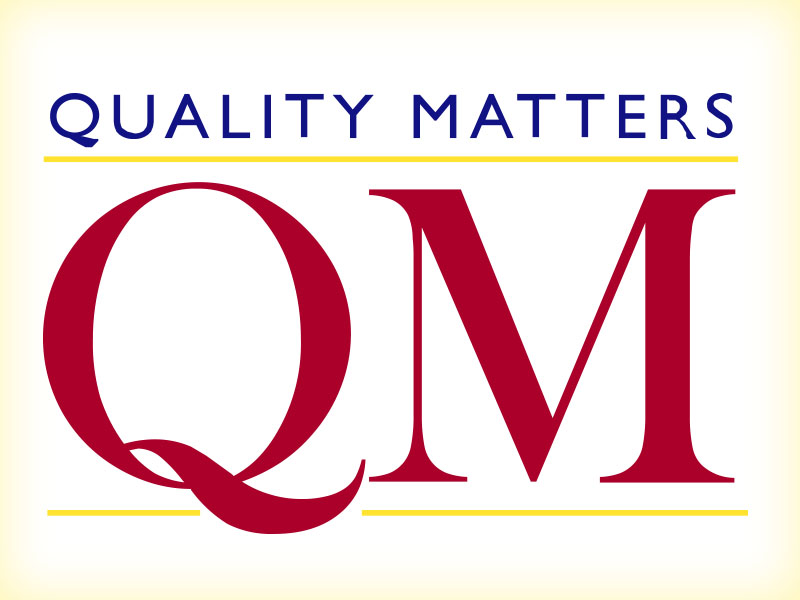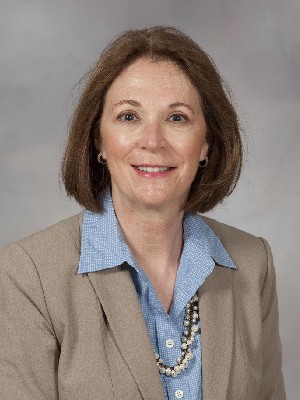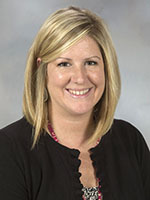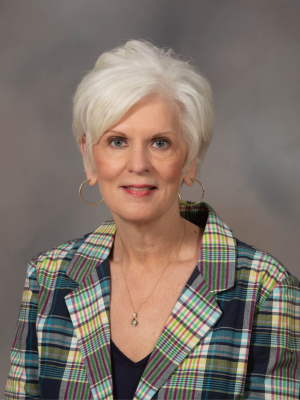QM certification solidifies commitment to online excellence

It’s no longer a secret that in today’s academic environment, the “Sage on the Stage” is becoming a relic of higher education: Online learning, no longer the wave of the future, has become mainstream.
With so many students at the University of Mississippi Medical Center turning to their laptop computers, tablets and smartphones to gain knowledge once only available by sitting in a classroom, reinforcing the quality of its online courses is paramount to the institution’s academic reputation.

“About half of our course offerings are online now, with almost half of our student population being taught in online courses,” said Dr. Jessica Bailey, dean of the School of Health Related Professions. “I tell students at orientation to the school that it is my responsibility to make sure their learning environment is the best that it can be.
“This certainly holds true for our online students.”
When Bailey speaks of holding online education up to strict standards, she’s not just paying lip service – three years ago, she was the first at UMMC to gain Quality Matters certification for a Doctor of Health Administration course she teaches online.
Taking her lead, several SHRP and School of Nursing faculty have obtained QM certification for online courses in departments ranging from Health Sciences, Medical Laboratory Science and Radiologic Sciences in SHRP to dental hygiene in the School of Dentistry and R.N.-to-B.S.N. in the School of Nursing.
Quality Matters is a nationally recognized faculty-centered peer-review body that rigorously assesses course learning objectives, instructional materials, learner activities, student support and activities to certify the quality of online courses in higher education. According to Bailey, it is the premier “stamp of approval” for recognizing and rewarding good online instruction.
Rebecca A. Butler, assistant professor in SHRP, and Dr. Christian Pruett, assistant professor of nursing, helped plot the course for their respective schools to gain QM certification of online courses in a true multidisciplinary effort.

“We worked together to develop the training materials,” Pruett said. “We collaborated well in bringing it to campus and training our faculty. This program helped us bring digital credentialing to campus – we were the first two schools to offer the badge to our faculty for completing training.
“It’s a real good example of what two schools can do together.”
According to Pruett, online students represent about half of the SON’s enrollment.
“One of the biggest goals you want to achieve in online learning is you want to have quality in course design,” he said. “Quality Matters is the first nationally recognized standard in quality learning. That’s why we chose QM certification.”
During the initial evaluation process and after SHRP had two courses certified through QM, Butler said the school began comparing student satisfaction between QM-certified courses and noncertified courses.

“We wanted to find out what effect the course redesign was having on student satisfaction,” Butler said. “We only received positive comments from students. The research indicated improved course navigation, ease of understanding when working through course material and the outcome of adding a variety of assessments indicated higher student satisfaction with the QM-certified courses.
“Each student conveyed that there was an assignment in the (QM-certified) course that spoke to them, spoke to their learning style.”
Verifying the online learning experience is consistent with face-to-face presentations are key components to QM certification.
“QM is very purposeful,” said Robin Thompson, assistant professor of health sciences. “Each course activity has a purpose to help the student to master the course objectives.”
Thompson just joined the Medical Center faculty last July. Although she was familiar with Quality Matters, she had not undergone any QM training before coming to UMMC. Along with Butler, she is now one of two QM peer reviewers in SHRP.
“There’s an intrinsic value for the faculty (to obtain QM certification) – they’re more invested in the process,” she said. “They desire the QM training, and in turn, that appreciation for QM makes their peers want to take part in it, also.
“Upon joining SHRP, one of the first things I did was enroll in the QM course on applying the rubric. Later, I enrolled in the QM peer-review course.”
About 18 SHRP faculty members have taken the school’s QM workshop to help prepare for Quality Matters review of their online courses, while eight faculty have completed the review process.
Butler said an additional facet of QM certification available to faculty is the opportunity to become peer reviewers.
“Certifying peer reviewers so they can sit on Quality Matters review teams to review courses is our next important partnership with the School of Nursing,” Butler said. “When a peer reviewer from the School of Nursing sits on a review for SHRP, we can then turn around and provide a peer reviewer for the School of Nursing.
“Having peer review faculty at our own institution saves money, resources and provides faculty with an opportunity to provide a service to each other.”

As chair of the Health Sciences Program in SHRP, Dr. Cynthia Casey said she became intrigued by Quality Matters and began inquiring about QM certification for a D.H.A. course she teaches. After going through the rigorous QM certification process for that course, she is now preparing all bachelor and graduate courses in her department for QM certification.
“QM is grounded in research and driven by best practices,” Casey said. “The courses are peer reviewed by experts in the specific areas of the courses. The reviewers provide feedback related to the quality of the courses and assist in prioritizing areas for improvement in meeting the QM standards.
“Quality Matters certification is important because not only does it signify the course meets quality assurance standards, but it also assists in preparing faculty in course development. The way an online course is designed and supported is important: Students do not have face-to-face contact with the instructor, so they need to have a course that is very clear about expectations and very consistent.”
Casey has become such an advocate of the QM process that she is registering for Quality Matters peer reviewer training.
“QM provides the means for faculty development in course design, course delivery and course evaluation,” she said. “I am seeking to become a peer reviewer so I can gain the knowledge to assist faculty in course development and meeting the QM standards, and I can be a reviewer within the UMMC system for online courses.”
Obtaining QM certification takes considerable time, expense and effort. Butler said from the start of the first workshop to finally meeting certification requirements, the entire process can take up to a full year to complete.
“It is exciting to watch the faculty go through the process and find value in it,” she said. “Faculty are reporting an increase in enjoyment and satisfaction when teaching in the online classroom.”
Pruett said the goal for the SON’s R.N.-to-B.S.N. Program is to gain QM certification of all online courses within a year. He said he hopes to eventually get the Doctor of Nursing Practice online program completely certified as well.
“We’ve done our research, we’ve done our training, we’ve gotten our feet wet with course reviews,” he said. “We’re ready for the next level.”

